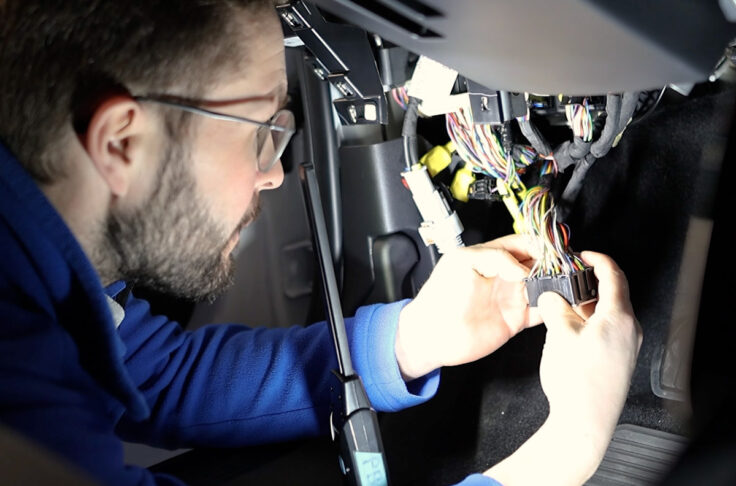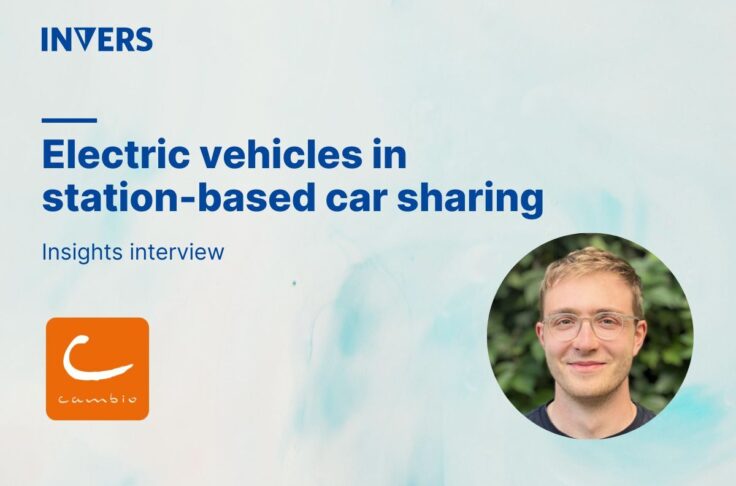
Car Sharing Industry Trends 2024

What challenges will car sharing operators have to face in the coming year? How is the industry developing? What new solutions are coming? How will technology advance the car sharing business model? The Invers team sees five important trends for 2024:
(1) Car sharing fleets will be increasingly confronted with the challenges of e-mobility
(2) Insourcing is meant to increase process efficiency
(3) Damage and misuse keep car sharing providers busy
(4) A few cities are creating car-sharing-friendly environments
(5) Local MaaS offerings and mobility hubs integrate and strengthen car sharing
Siegen, Dezember 28th, 2023 – Car sharing is a transformative force, reshaping users’ mobility behaviors and facilitating a seamless transition towards more sustainable modes of transportation. In its fast-evolving landscape, five pivotal trends are set to shape the industry in 2024:
(1) Car sharing fleets will be increasingly confronted with the challenges of e-mobility
The proportion of electric vehicles in car sharing fleets is significantly higher than that in private cars. According to the German Car Sharing Association, for example, 20.5% of all car sharing vehicles in that country are EVs. In contrast, only 3.9% of the national car fleet is electric, according to the Federal Motor Transport Authority. For Italy, the Osservatorio Nazionale states that 60% of vehicles in station-based car sharing and 40% in free-floating car sharing are electric. According to the car sharing industry association CoMoUK, 14% of car sharing vehicles in the UK are electric. This increasing electrification of fleets poses challenges to operators around the world. For example, repairs for electric vehicles are sometimes significantly more expensive than for vehicles with a combustion engine. In addition, the residual value of electric vehicles cannot be reliably calculated, and the charging infrastructure is not yet sufficiently developed in many countries.
(2) Insourcing is meant to increase process efficiency
Numerous car sharing providers are increasingly relying on their own teams to improve processes, with the aim of profitability. This is not just about the tasks of adding vehicles to the fleet or removing them from the fleet quickly and cost-effectively. They’re taking a closer look at day-to-day operational processes such as vehicle maintenance, cleaning and damage management. How long does it take for a vehicle to pass inspection? What processes does a car go through after an accident? When is it back on the road? Previously, for example, in the event of damages, cars had to be removed from fleets and taken to partner repair shops before returning to the fleet. In the future, some car sharing providers will have this process carried out by their own teams in their own repair shops. The same applies to cleaning: operators are starting to do this in-house while carrying out additional tasks, such as chargin vehicles and repairing minor damages. This lets them keep operational knowledge and skills within their organizations, and it enables quicker turnaround times for vehicles to minimize their downtime.
(3) Damage and misuse keep car sharing providers busy
„Don’t be gentle, it’s a rental” – unfortunately, this sentence succinctly summarizes what car sharing operators experience in many places. Although the vast majority of their customers take good care of the vehicles they borrow, even the relatively few customers who do not do so cause considerable damage. In some cities, there are even districts that operators exclude from their business area due to too many cases of damage. On average, operators have to invest up to 10% of their revenue in repairs and claims management because of often unreported damages. Numerous operators have prioritized this issue in 2023 and will continue to look for effective solutions in the coming year.
(4) A few cities are creating car-sharing-friendly environments
Good cooperation with cities and local authorities is critical to the success of car sharing providers. This relates to not only parking fees, but also to the city’s philosophy on transportation. Cooperation is not only important for the operators but also for cities, as they can demonstrably benefit from an expansion of car sharing services, particularly when it comes to reducing emissions. A recent study by the Clean Cities Campaign has shown that a consistently progressive transport policy that incorporates car sharing enables European cities to reduce their emissions more easily, cost-effectively, and quickly than through large-scale infrastructure projects such as new subways. In the ranking of particularly sharing-friendly cities, the Clean Cities Campaign lists Copenhagen and Oslo at the top. The city administration in Copenhagen, for example, has created such a good environment for shared vehicles that Hyre, which is already successful in Sweden and Norway, has started operating a service in the Danish capital since May 2023.
(5) Local MaaS offerings and mobility hubs integrate and strengthen car sharing
The increasing prevalence of Mobility-as-a-Service (MaaS) apps, which integrate public transport with various mobility services, and the rise of mobility stations in central urban areas are drawing attention to car sharing services and establishing them in the mobility mix of the future. In Hamburg, the hvv Switch app exemplifies this trend by providing access to car sharing services from Miles or Sixt Share, micromobility options from Tier or Voi, and ride-hailing services from Moia. Additionally, the app facilitates the purchase of the Deutschlandticket, and tickets for regional transport. In the Netherlands, the MaaS app Gaiyo bundles mobility services across the country into an ecosystem of private and public services. In addition to buses, trains, bicycles and e-scooters, customers can use car sharing services from MyWheels, Amber, GreenWheels and Share Now to get to their destination efficiently and conveniently.
About Invers
Invers, inventor of automated vehicle sharing, enables mobility service providers to launch, operate and scale their offerings with integrated hardware and software solutions specifically designed for developers of shared mobility services. As the world’s first shared mobility technology company, Invers is developing and reliably maintaining the fundamental building blocks at scale to offer its customers cost-efficient and easily implementable tech solutions.
The company acts as an independent and reliable partner for operators of services such as car sharing, car subscription, moped sharing, ride pooling and car rental services with the vision to make the use of shared vehicles more convenient and affordable than ownership. Customers include Share Now, Cambio, GreenMobility, Miles, Zity, Getaround and Flinkster. The company was founded in 1993 and has locations in Siegen, Cologne and Vancouver. The development takes place entirely in Germany.


